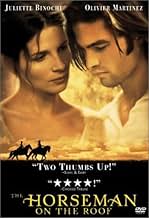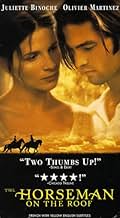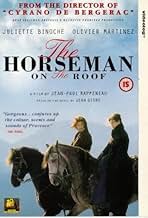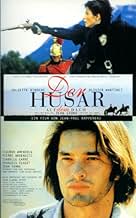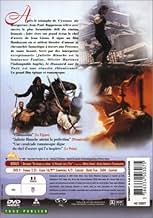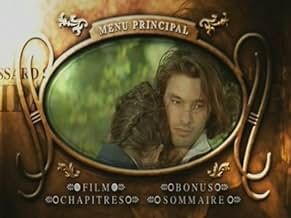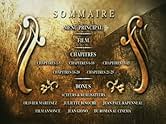IMDb RATING
7.0/10
6.6K
YOUR RATING
In a time of war and disease, a young officer gallantly tries to help a young woman find her husband.In a time of war and disease, a young officer gallantly tries to help a young woman find her husband.In a time of war and disease, a young officer gallantly tries to help a young woman find her husband.
- Awards
- 4 wins & 8 nominations total
Featured reviews
This gorgeous movie was set in the cholera stricken period which wiped out the whole of Europe in 10 days. Juliette Binoche, in her pre-The English Patient role, was as gorgeous and subtle as ever. The thing about this movie though that it's billed as a romance but you don't see it anywhere but just hints of it and feel the sexual tensions between the 2 main characters. Rather disappointing for some but it's that exact same formula which makes it such a beautiful movie to watch. To top it off, it was filmed in the French countryside which is so breathtaking that you could just watch the movie for the cinematography alone. All in all, it's a superb movie in the tradition of finely crafted French costume dramas.
Le Hussard sur le Toit presents its audience with the grim reality of cholera-stricken rural France in 1832 and its effect on a journey of escape by two anxious visitors. The frequent images of corpses and mass burial are refreshed by the breathtaking and beautifully shot scenery, itself brought to life by characters who dilute the presence of death with an oxymoronic mix of comedy and despair. Carrion crows regularly appear, mercilessly flying around in sinister anticipation, their cawing beaks wide open with hunger.
Juliette Binoche enters only in the second half, her laconic period style beautifully portrayed, and preparing the way for her appearance as George Sand in Les Enfants du Siecle (1999). Le Hussard's plot is simple, its screenplay uncomplicated. But the action is fast and Bond-like and the innocence of Martinez' military-dominated character is uncanny. But it is its simplicity that makes this movie a work of exceptional visual satisfaction, for romantics or action-lovers alike.
Juliette Binoche enters only in the second half, her laconic period style beautifully portrayed, and preparing the way for her appearance as George Sand in Les Enfants du Siecle (1999). Le Hussard's plot is simple, its screenplay uncomplicated. But the action is fast and Bond-like and the innocence of Martinez' military-dominated character is uncanny. But it is its simplicity that makes this movie a work of exceptional visual satisfaction, for romantics or action-lovers alike.
It takes quite an amazing group of people to make a great epic. Aside from great source material, really all the components have to be superb, and it has to be put together in such a way that the viewer is not left wondering what happened to a decade (see: Queen Margot).
Most of the necessary pieces are here, but there is something missing, some element that keeps it from being a truly great film. It is certainly a good one, a movie that is worth seeing, and worth doing so on a big screen, thanks to its beautiful scenery between France and Italy. The stars are very watchable, and the story is tight enough to keep your attention throughout. Unlike many films of its genre, it is not overlong.
Ironically, I found myself comparing it to another Binoche epic, The English Patient, which made me wonder what was lacking in light of what I consider to be a finer film. In the end, it may be simply that the latter had a novel that was more compelling, or a lead (Fiennes) that was just more riveting.
The story is of two people fleeing the outbreak of cholera in early 19th century France. Angelo is attempting to return to his native Italy, to join the revolution, and Pauline is searching for something... They manage to aid each other's flight.
In the great tradition of French period epics, this is not the pinnacle, but it is near the upper echelon. It's worth a shot.
Most of the necessary pieces are here, but there is something missing, some element that keeps it from being a truly great film. It is certainly a good one, a movie that is worth seeing, and worth doing so on a big screen, thanks to its beautiful scenery between France and Italy. The stars are very watchable, and the story is tight enough to keep your attention throughout. Unlike many films of its genre, it is not overlong.
Ironically, I found myself comparing it to another Binoche epic, The English Patient, which made me wonder what was lacking in light of what I consider to be a finer film. In the end, it may be simply that the latter had a novel that was more compelling, or a lead (Fiennes) that was just more riveting.
The story is of two people fleeing the outbreak of cholera in early 19th century France. Angelo is attempting to return to his native Italy, to join the revolution, and Pauline is searching for something... They manage to aid each other's flight.
In the great tradition of French period epics, this is not the pinnacle, but it is near the upper echelon. It's worth a shot.
10janusz-2
I found this film to be excellent. Though I am a student of history, I really do not know all the details regarding this episode of the freeing of Italy from Austrian authoritarianism. Though interesting, the historical aspect of the movie was not that important to me. It was a highly enjoyable adventure film that could have been placed in lots of different historical times.
Besides being a great adventure film it masterfully dealt with a most wide range of emotions. There were many undertones and harmonics dealing with fear, desperation, horror, escape, passion, love, honor and divine, or natural, justice.
What was so fascinating to me was how the movie showed the power of freedom, courage and focus. The protagonist was raised by his mother (a most curiously powerful presence in this movie even though we never see or hear her)to be independent and freedom loving and this movie shows how strong and almost invincible this makes him because he believes it and lives it with all his heart. All around him the world is literally falling apart and going mad from fear and disease and yet, by neither railing against it nor taking on these thoughts, he triumphs with his will to live and being true to his own vision at all times.
And as an added bonus, the visual artistry of this movie, from the titles all the way to the end is beautiful to behold. The scenery, costumes, sets, actors, camera angles and etc. are all brilliantly satisfying. The movie was a joy to see.
Besides being a great adventure film it masterfully dealt with a most wide range of emotions. There were many undertones and harmonics dealing with fear, desperation, horror, escape, passion, love, honor and divine, or natural, justice.
What was so fascinating to me was how the movie showed the power of freedom, courage and focus. The protagonist was raised by his mother (a most curiously powerful presence in this movie even though we never see or hear her)to be independent and freedom loving and this movie shows how strong and almost invincible this makes him because he believes it and lives it with all his heart. All around him the world is literally falling apart and going mad from fear and disease and yet, by neither railing against it nor taking on these thoughts, he triumphs with his will to live and being true to his own vision at all times.
And as an added bonus, the visual artistry of this movie, from the titles all the way to the end is beautiful to behold. The scenery, costumes, sets, actors, camera angles and etc. are all brilliantly satisfying. The movie was a joy to see.
Juliette Binoche and Olivier Martinez look great, and they throw themselves enthusiastically into their roles. They do have a certain chemistry together, but the film devotes much more attention to the effects of the French cholera epidemic in 1832 on the countryside. The plot that kicks off the story rather dramatically is that of the assassination plots against Italian nationalists by Austrians who'd like to take over northern Italy. The end of the movie, however, reveals the true focus of the story. I wish that the majority of the movie was devoted to that story.
Did you know
- TriviaShot over a period of four and a half months in 50 different locations.
- Alternate versionsThe version released in the U.S. was significantly shorter than the original French version, because the American distributor removed 15-20 minutes of footage.
- How long is The Horseman on the Roof?Powered by Alexa
Details
- Release date
- Country of origin
- Official site
- Languages
- Also known as
- Damdaki süvari
- Filming locations
- Menthon-Saint-Bernard, Haute-Savoie, France(final castle scene)
- Production companies
- See more company credits at IMDbPro
Box office
- Gross US & Canada
- $1,320,043
- Gross worldwide
- $1,320,043
- Runtime
- 1h 58m(118 min)
- Color
- Sound mix
- Aspect ratio
- 2.35 : 1
Contribute to this page
Suggest an edit or add missing content


